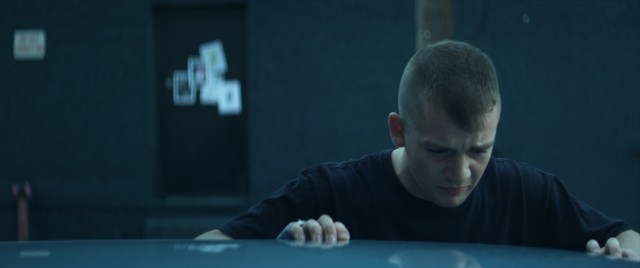Working for Short of the Week, a question that is often aimed my way is: What makes a great short film? There are a number of different answers to this, but my most common (and concentrated) response is that it should be original and memorable. Daniel Ferrer’s 18-minute short, Ex Disposer, is one that has dwelled inside my headspace since I first saw it as part of Palm Springs ShortFest back in 2020.
The tale of a drummer kicked out of his old band, Disposer, when his uncontrollable emotions get the better of him, Ferrer’s short is an intense, simmering watch propelled by the electric central performance of Jack DiFalco. With the writer/director revealing his work was influenced by the “character-driven”, “slow-burning films” of Paul Schrader, Mike Leigh, Wong Kar Wai, and Lynne Ramsay, he also admits that all his films are “deeply personal” as they deal directly or indirectly, with his experience of living with clinical depression.

Jack DiFalco as Andy – the destructive ex-drummer of hardcore band Disposer
Ferrer’s intimate relationship with the subject matter at the core of Ex Disposer radiates from the screen in the intensity of his film and in particular the character of Andy and DiFalco’s portrayal of him. Penned after a two week stay in a mental hospital, the narrative captures feelings of avoidance and anxiety with such fierce authority it’s almost too fervent to watch at times. Yet, you can’t look away, not even for a second, as like its central character, the short feels like it could implode at any moment. You don’t watch with any kind of glee at Andy’s predicament, you just feel so connected to him you have to know what happens.
With the short’s timeline flitting between the past and present, this approach is particularly effective at exploring both the short and long term impact of mental illness as we witness Andy’s crushing exit from the band and how he’s still struggling with his departure now. “The film also aims to demystify the ‘tortured artist’ trope”, Ferrer adds, revealing that he wanted to depict “a more toxic relationship between mental illness and creative vitality, one that is more often ruinous than fruitful”.

The hardcore music, with its unpredictable energy and intensity feels like the perfect companion to Andy’s troubles.
Although director Ferrer has the deep-rooted connection to the themes of Ex Disposer, it’s producer Amelia Spitler who sums up the power of the film so perfectly: “Andy is the everyman who is more than his mental illness. He’s in need of empathy, from his friends and from himself, regarding his heightened anxiety. Daniel’s craft gives young men like Andy hope – for help from the shackles of toxic masculinity, from the stigma of mental illness, and for the gift of empathy to yourself”.
I’ve tried to sum up in my own words what it is about Ex Disposer that speaks to me so loudly, but Spitler nails it with her description here. Fellow S/W writer Georg Csarmann talked about how empathy can be difficult to maintain in his recent write-up of Pete Quandt’s short doc Tuesday Afternoon, but Ferrer’s film has empathy in the bucket loads. Watching his film you feel the “huge boulder” Andy has resting on him and you want to help him relieve the pressure, but you’re also aware that doing so could break him.
The final monologue DiFalco delivers feels like the perfect resolution to Ex Disposer. It encapsulates his situation so profoundly it hurts to hear and although there’s a little relief at the end, that line “and where would you put that on the chart” producing such a cathartic, short-lived laugh, as we return to Andy’s troubled face, the sound of a cymbal reverberating in the background, his story echoes around our head in a similar fashion. The film might be over, but the journey of its protagonist continues to live in our head for sometime after.

 Rob Munday
Rob Munday